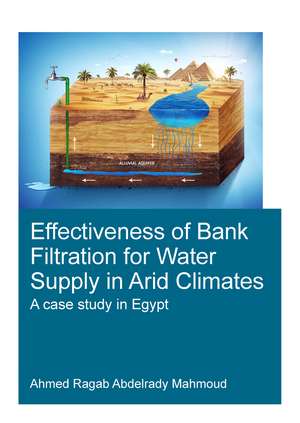Effectiveness of Bank Filtration for Water Supply in Arid Climates: IHE Delft PhD Thesis Series
Autor Ahmed Ragab Abdelrady Mahmouden Limba Engleză Paperback – 29 dec 2020
Din seria IHE Delft PhD Thesis Series
-
 Preț: 377.82 lei
Preț: 377.82 lei - 27%
 Preț: 473.10 lei
Preț: 473.10 lei - 23%
 Preț: 257.25 lei
Preț: 257.25 lei - 28%
 Preț: 492.31 lei
Preț: 492.31 lei - 27%
 Preț: 472.25 lei
Preț: 472.25 lei - 16%
 Preț: 322.98 lei
Preț: 322.98 lei - 29%
 Preț: 524.35 lei
Preț: 524.35 lei - 35%
 Preț: 295.46 lei
Preț: 295.46 lei - 26%
 Preț: 399.88 lei
Preț: 399.88 lei - 30%
 Preț: 1015.76 lei
Preț: 1015.76 lei - 23%
 Preț: 268.83 lei
Preț: 268.83 lei - 44%
 Preț: 256.76 lei
Preț: 256.76 lei - 23%
 Preț: 254.47 lei
Preț: 254.47 lei - 25%
 Preț: 339.78 lei
Preț: 339.78 lei - 16%
 Preț: 322.01 lei
Preț: 322.01 lei - 26%
 Preț: 455.79 lei
Preț: 455.79 lei - 28%
 Preț: 399.06 lei
Preț: 399.06 lei - 27%
 Preț: 427.41 lei
Preț: 427.41 lei - 25%
 Preț: 371.52 lei
Preț: 371.52 lei - 26%
 Preț: 373.21 lei
Preț: 373.21 lei - 26%
 Preț: 328.64 lei
Preț: 328.64 lei - 18%
 Preț: 348.86 lei
Preț: 348.86 lei - 25%
 Preț: 369.82 lei
Preț: 369.82 lei - 21%
 Preț: 174.31 lei
Preț: 174.31 lei - 26%
 Preț: 414.78 lei
Preț: 414.78 lei - 27%
 Preț: 454.94 lei
Preț: 454.94 lei - 27%
 Preț: 315.05 lei
Preț: 315.05 lei - 21%
 Preț: 256.32 lei
Preț: 256.32 lei - 18%
 Preț: 296.68 lei
Preț: 296.68 lei - 26%
 Preț: 353.39 lei
Preț: 353.39 lei - 27%
 Preț: 326.95 lei
Preț: 326.95 lei - 18%
 Preț: 349.36 lei
Preț: 349.36 lei - 28%
 Preț: 366.05 lei
Preț: 366.05 lei - 25%
 Preț: 322.47 lei
Preț: 322.47 lei - 27%
 Preț: 425.74 lei
Preț: 425.74 lei - 22%
 Preț: 211.93 lei
Preț: 211.93 lei - 27%
 Preț: 474.03 lei
Preț: 474.03 lei - 16%
 Preț: 322.98 lei
Preț: 322.98 lei - 27%
 Preț: 367.30 lei
Preț: 367.30 lei - 25%
 Preț: 328.22 lei
Preț: 328.22 lei - 27%
 Preț: 350.43 lei
Preț: 350.43 lei - 25%
 Preț: 472.25 lei
Preț: 472.25 lei - 28%
 Preț: 498.58 lei
Preț: 498.58 lei - 28%
 Preț: 349.59 lei
Preț: 349.59 lei - 24%
 Preț: 163.04 lei
Preț: 163.04 lei - 17%
 Preț: 350.29 lei
Preț: 350.29 lei - 28%
 Preț: 550.16 lei
Preț: 550.16 lei - 25%
 Preț: 552.62 lei
Preț: 552.62 lei - 26%
 Preț: 384.59 lei
Preț: 384.59 lei - 20%
 Preț: 177.00 lei
Preț: 177.00 lei
Preț: 455.29 lei
Preț vechi: 619.65 lei
-27% Nou
Puncte Express: 683
Preț estimativ în valută:
87.13€ • 94.61$ • 73.19£
87.13€ • 94.61$ • 73.19£
Carte tipărită la comandă
Livrare economică 23 aprilie-07 mai
Preluare comenzi: 021 569.72.76
Specificații
ISBN-13: 9780367746735
ISBN-10: 0367746735
Pagini: 222
Dimensiuni: 170 x 240 mm
Greutate: 0.38 kg
Ediția:1
Editura: CRC Press
Colecția CRC Press
Seria IHE Delft PhD Thesis Series
ISBN-10: 0367746735
Pagini: 222
Dimensiuni: 170 x 240 mm
Greutate: 0.38 kg
Ediția:1
Editura: CRC Press
Colecția CRC Press
Seria IHE Delft PhD Thesis Series
Public țintă
PostgraduateCuprins
Introduction, Removal of dissolved organic matter during bank filtration, Removal of organics micro-pollutants during bank filtration, Removal of metals during bank filtration, Reduction of iron, manganese and arsenic during bank filtration, Analysis of the performance of Bank Filtration for Water Supply in Arid Climates: case study in Egypt, Conclusions and future perspective.
Notă biografică
Ahmed is a post-doctoral researcher at the water management department, TU Delft. He obtained his bachelor degree in chemistry from Aswan University (Egypt), postgraduate diploma in applied environmental geoscience from Assiut University (Egypt), a master of science in water resources management at ITC, University of Twente. He conducted his PhD research at TU Delft and IHE-Delft, focused on development of a management framework for bank filtration technique for water supply in arid environments.
Ahmed has participated in several projects in water resources management, including; groundwater modelling, remote sensing for resources management, and modelling of water quality. He also developed a remote-sensing based model (AquaSEBS) to estimate the evaporation rate over fresh and saline water bodies. His research interests include: DNA tracer for hydrological processes, managed aquifer recharge, removal of micropollutants, and groundwater modelling.
Ahmed has participated in several projects in water resources management, including; groundwater modelling, remote sensing for resources management, and modelling of water quality. He also developed a remote-sensing based model (AquaSEBS) to estimate the evaporation rate over fresh and saline water bodies. His research interests include: DNA tracer for hydrological processes, managed aquifer recharge, removal of micropollutants, and groundwater modelling.
Descriere
This research was conducted to facilitate the transferability of BF to nations with arid climates. Batch and column laboratory-scale studies were performed to determine the effect of environmental variables on chemical pollutant removal. A 3 step framework was followed to examine the effectiveness of BF in Aswan, Egypt.
